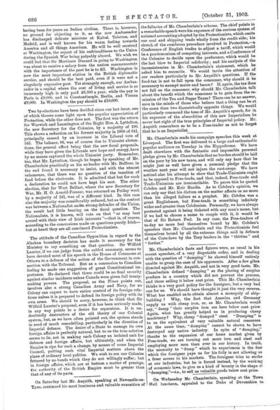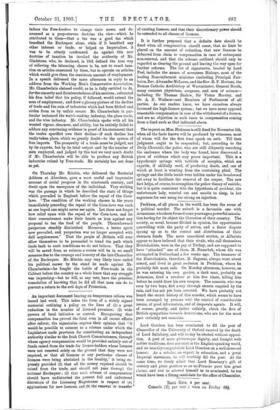On Wednesday Mr. Chamberlain, speaking at the Town Hall luirtheon,
appealed to the Duke of Devonshire to. induce the Free-looders to change their name, and de- nounced as a preposterous doctrine the view—which he attributed to them—that a tax was a good tax which benefited the Exchequer alone, while if it benefited any other • interest or trade, or helped on Imperialism, it was to be utterly condemned. As against this new doctrine of taxation he invoked the authority of Mr. Gladstone, who, he declared, in 1861 defined the true way of relieving the labouring classes to be, not to remit taxa- tion on articles consumed by them, but to operate on articles which would give them the maximum amount of employment. In a speech delivered the same afternoon in reply to an address from the Working Men's Conservative Association, Mr. Chamberlain claimed credit, as he is fully entitled to do for the sincerity and disinterestedness of his motives ; reiterated his firm belief that his policy, if followed, would extend the area of employment; and drew a gloomy picture of the decline of trade and the ruin of industries which had been filched and stolen from us by unfair means. Mr. Chamberlain in par- ticular instanced the watch-making industry, the glass trade, and the wire industry. Mr. Chamberlain spoke with all his wonted vigour, clearness, and ability, but he entirely failed to adduce any convincing evidence in proof of his statement that the trades specified owe their decline—if such decline has really taken place, which we greatly doubt—to the system of free imports. The prosperity of a trade must be judged, not by its exports, but by its total output and by the number of men employed, and judged by this test we very much doubt if Mr. Chamberlain will be able to produce any British industries ruined by Free-trade. He certainly has not done so yet.



















































 Previous page
Previous page